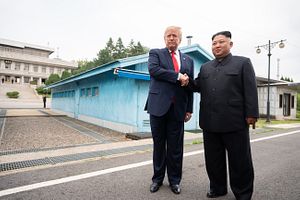U.S. President Donald J. Trump’s latest outreach to North Korea appears to have resulted in the promise of another meeting. It’s worth remembering, however, that things could have gone much differently. Last year, Jeffrey Lewis of the Middlebury Institute of International Studies at Monterey published The 2020 Commission Report on the North Korean Nuclear Attacks Against the United States, a short novel describing the mistakes made by all sides in the run up to a speculative nuclear war between North Korea, Japan, South Korea, and the United States. In the novel, tactical and strategic nuclear launches by North Korea result in millions of deaths in Asia and North America.
Lewis models his work on the 9/11 Commission Report, which traced the decisions that led to al-Qaeda’s attacks against the United States on September 11, 2001, in an authoritative, yet readable form. Lewis’ approach avoids some of the problems associated with Peter Singer and August Cole’s Ghost Fleet, which did passably well in recounting the technological aspects of great power war, and somewhat less well at describing the human interactions that accompanied the war.
For the most part, the 2020 Commission is frighteningly, remarkably plausible. Errors in decision-making mirror errors that we know have taken place in real-life. Almost all of the decision-makers are based on real people with real interests and real personality traits, but for the most part Lewis does not let these traits dominate the narrative. Instead, they illuminate how decisions get made in the context of bureaucratic tension and international competition.
Especially in context of Trump’s outreach to North Korea, the most controversial aspect of the 2020 Commission is undoubtedly its depiction of President Trump. The 2020 Commission’s Trump is an exaggeration of the president that we find in many accounts of this administration (Bob Woodward’s Fear comes to mind), but does not seem excessively ridiculous based on what we know about the president’s inner circle. Some elements are simply unfair, or included for comedic effect; the notion that the president would care about correcting his golf score goes a touch too far, as (probably) does the physical struggle for the nuclear “football” in the bunker at Mar-a-Lago.
But Lewis’ handling of the cabinet situation in the Trump administration is adroit. Lewis guesses wrong with respect to which members of the Trump administration survive into 2019; James Mattis remains secretary of defense, playing a large role in the war, while John Bolton and Mike Pompeo have been fired (by tweet) at the time of the novel’s action. Nevertheless, Lewis captures the dysfunction of Trump’s foreign policy team with what feels like authenticity. If anything, the extant situation, in which the United States has lacked a secretary of defense for the last six months, would have made the events of the novel even more terrifying.
Unfortunately, Lewis also leaves out any in depth discussion of the international reaction to the attacks. For example, China leaves the narrative early on, after brokering a meeting between the North Korean UN delegation and members of the U.S. State Department. In the event of a nuclear launch, Beijing (not to mention Moscow) would undoubtedly have been asked to play a major role, but we see little of that here, beyond a gesture at the idea that Trump would retaliate against both China and North Korea for the nuclear attacks on the U.S. homeland.
On this point, Lewis mostly abstracts the U.S.-ROK conventional conquest of North Korea following the nuclear attacks. While the United States finishes the war with conventional weaponry, its seems just as plausible that many U.S. presidents would use nuclear weapons, at least in symbolic fashion, in response to a nuclear attack on the homeland. Such use would preserve the deterrent threat of U.S. weapons. At the very least, the question of whether to demonstrate U.S. resolve by retaliating against North Korea with nukes would have generated heated policy debate.
Perhaps the most important takeaway from the 2020 Commission is that missiles are not, in fact, a very useful way of sending clear messages to competitors. The target always gets a vote with respect to how it interprets an attack, and the inability to control perceptions can lead to unwanted escalation. Even after President Trump leaves office, the novel will remain a chilling vision of how misperception could lead to a devastating nuclear war.

































